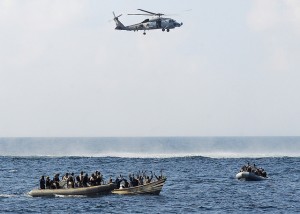The Chandlers, a retired British couple who were held hostage by Somali pirates for over a year, captured the attention of the public and drew widespread criticism of the Foreign Office and government who appeared powerless to intervene, or at least make any public moves. This high-profile case thrust the growth in piracy in the Indian Ocean into the consciousness of the British public. However, it is merely one among many such cases, not all with such happy endings. The threat of piracy in the Gulf of Aden continues to be a problem despite the efforts of a coalition of international naval forces who are attempting to police this vast expanse of ocean. A major problem for anti-piracy efforts is that these ‘pirates’ are hijacking boats using low-tech small boats that are almost impossible to track across huge expanses of ocean. Somalia, a ‘failed state’ provides the perfect base from which these pirates are able to operate and enables them to continue to elude capture, and prevents the international community from solving the problem once and for all. The capture of a handful of these so-called pirates does not solve the underlying economic imperative which underpins the phenomenon, for every individual captured another merely takes his place.
The source of income for these pirates is not, as in the fantasy image, plunder, treasures and booty carried off from vessels. Rather, these pirates capture ships and ransom the lives of the crew from the companies they work for, whose insurance policies increasingly bear the burden of such ransoms. The problem for the Chandlers was that they did not work for an international shipping company. They were not transporting oil across the Gulf of Aden, but merely travelling as part of their retirement—and as a result they did not have the financial backers to pay the ransom demanded. So began their long ordeal, transmitted across the globe through videos of the couple begging for release.
The Chandler case is certainly the one that received the most coverage in the UK, but the Royal Navy and its partners are constantly operating in the Indian Ocean; their latest success was the capture of twelve Somali pirates on January 14th. As part of a NATO-led force, the RFA Fort Victoria and a US Navy Vessel intercepted the pirate’s boat, as Royal Marines boarded the vessel. This is one of many such operations that the Royal Navy and Royal Marines are engaged in as part of the counter-piracy operation.
Defence Secretary Hammond explained at a press conference after the successful operation that this action was part of the remit of British forces whereby “The Royal Navy and Royal Marines are playing a crucial role in securing and protecting international sea lanes that are vital to global trade.” He added: “This operation off the coast of Somalia is a clear demonstration of Britain’s ability to tackle piracy that threatens our interests.”
The short-term successes of operations such as these, are, however, overshadowed by the continuation of the underlying causes. The problem will persist while there remains no stable government in Somali and until a clear legal process and court of jurisdiction is established. Currently the only recourse to prosecution lies with other states in the region being willing and able to prosecute the pirates. Kenya and the Seychelles have taken cases in the past and do prosecute, but it is difficult to deter piracy when the chances of profit are high and the risks of indictment are low.
Last year, David Cameron announced a conference on the piracy problem to be held in London in February 2012 with the aim of bringing together the international community to devise strategies to protect ships from pirates. This came on the back of his announcement that ships bearing Union Jacks would be entitled to carry weapons for self-defence.
Giles Heimman, chairman of the international anti-piracy campaign SOS (Save Our Seafarers), expressed his delight at the Prime Minister’s focus on Somali piracy and the extraordinary human and economic cost that it was causing in the Gulf of Aden.
The solution will not be a simple one; it depends not just on the ability to secure freedom of passage in such vital shipping routes but also on a stable political settlement and massive investment in the state of Somalia. A short-term solution is fine—capture the pirates and free the hostages, even work to establish a functional internationally recognised system for prosecution—but ultimately, the instability and lack of economic options for the people of the region will persist without a counter-piracy policy that emphasises not just the protection of shipping lanes, but also the rebuilding of Somalia.




